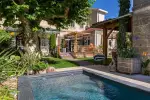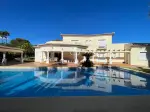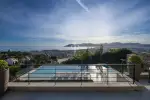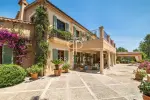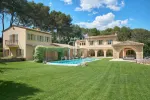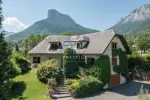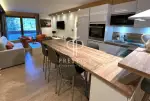Grand 7 bedroom Chateau for sale in Sauveterre de Guyenne, Aquitaine
The property benefits from three interconnecting reception rooms with the central one opening to a sweeping stone staircase into the gardens and parkland which surround the house.
The kitchen and utility rooms are well-fitted with bespoke, painted wooden units and the lower ground floor, which opens to the gardens has additional accommodation.
To one side is a large swimming pool, surrounded by a fenced terrace and overlooked by a spacious pool house.
There are traditional outbuildings, the remains of an ol...
The property benefits from three interconnecting reception rooms with the central one opening to a sweeping stone staircase into the gardens and parkland which surround the house.
The kitchen and utility rooms are well-fitted with bespoke, painted wooden units and the lower ground floor, which opens to the gardens has additional accommodation.
To one side is a large swimming pool, surrounded by a fenced terrace and overlooked by a spacious pool house.
There are traditional outbuildings, the remains of an older chateau in the gardens, a circular carriage drive and imposing gates.
The property is on the edge of a popular village in the rural Gironde and is approximately 20km from St Emilion.
Features
Location
Where is this property?
This House is located in Sauveterre de Guyenne in France
For security, the map shows the nearest town or village. Please get in touch for full details.
Search Location
Find Properties near Sauveterre de Guyenne
Airports near Sauveterre de Guyenne
More Luxury Properties
Buying a Property in France
1. Signing the Agreement (Compris)
On finding a property you wish to purchase you will need to negotiate the terms, price and conditions of the sale with the owner.
The next step, once you are in agreement, is to sign the preliminary contract (Compromis de Vente). This is a legal document and after ten days will be binding on both parties. Rules change frequently in France and it is best to consult with your notary about when this period starts. Generally the compris will be signed in France with the Agent.
Variants can be included in the compris, for example an Acte (clause) can be added if the name or names to go on the title deed have not been finalised. If a mortgage will be required to purchase the property, the details for this, including the name of the mortgage company, must be on the compris.
2. Paying the Deposit
Generally the deposit will be 10% of the agreed purchase price. This will normally be paid to the notaire. There are exceptions to this, if the agent holds a carte professionelle, is bonded and fully registered then you may pay them, but do not hand over the deposit to anyone else. If for some reason the purchase does not go through, for example, if you write to the notaire and the agent that you do not wish to go continue with the purchase before the contract is binding (within seven days of signing the compris), then your deposit would be repaid. This would also apply if a condition had not been met, or the mayor or S.A.F.E.R. (a government agency that has the right of first purchase on most rural property that comes onto the market in France) could oblige the purchaser to give way. If you decide after the seven days 'cooling off' period that you do not wish to complete the purchase and pull out of the sale you would lose your deposit. If however the vendor pulls out of the sale then you will receive your deposit back plus the same amount from the vendor.
3. On Completion
Generally it will take around two or three months to complete the purchase.
During this time the balance of the purchase money must be paid into the account of the notaire, this must be done well ahead of the completion date. The notaire will prepare the documents, check that the deed of sale (Acte de Vente) is in order and have the legal title ready to be signed over. It is possible to have someone sign on your behalf if you give them power of attorney. An interpreter may be of use at this point if your French is not very good and many Notaires will suggest (or insist) that an interpreter is with you.
